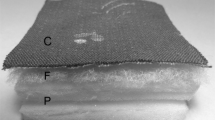Abstract
IN a recent communication on this subject1, O. C. de C. Ellis makes a number of statements which should not go unchallenged. First, it is stated that carbon tetrachloride will not extinguish petrol fires. For many years carbon tetrachloride has had worldwide use for the extinction of petrol fires, particularly those associated with internal combustion engines, and its reputation rests to a large extent on its success for this very purpose. Secondly, it does not decompose stoichiometrically to yield twice its vapour volume of chlorine ; the amount of chlorine evolved in a fire is, in most cases, negligible2.
Similar content being viewed by others
References
Ellis, O. C. de C., Nature, 161, 402 (1948).
Fieldner and Katz, J. Franklin Inst., 190, 543 (1920).
Garland, A., and Camps, F. E., Brit. J. Ind. Med., 2, 209 (1945).
Henderson and Haggard, "Noxious Gases and the Principles of Respiration Influencing their Action" (Reinhold Pub. Corp., New York, 1943).
Author information
Authors and Affiliations
Rights and permissions
About this article
Cite this article
NICHOLSON, A. Extinction of Petrol Fires by Methyl Iodide. Nature 162, 111–112 (1948). https://doi.org/10.1038/162111b0
Issue Date:
DOI: https://doi.org/10.1038/162111b0
- Springer Nature Limited





